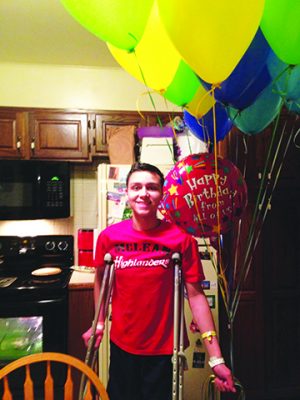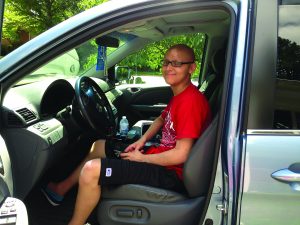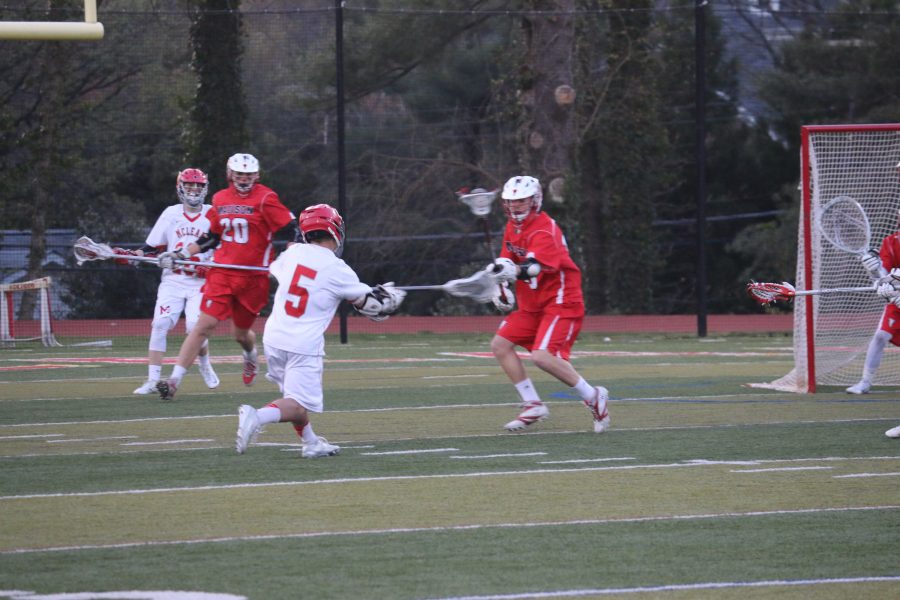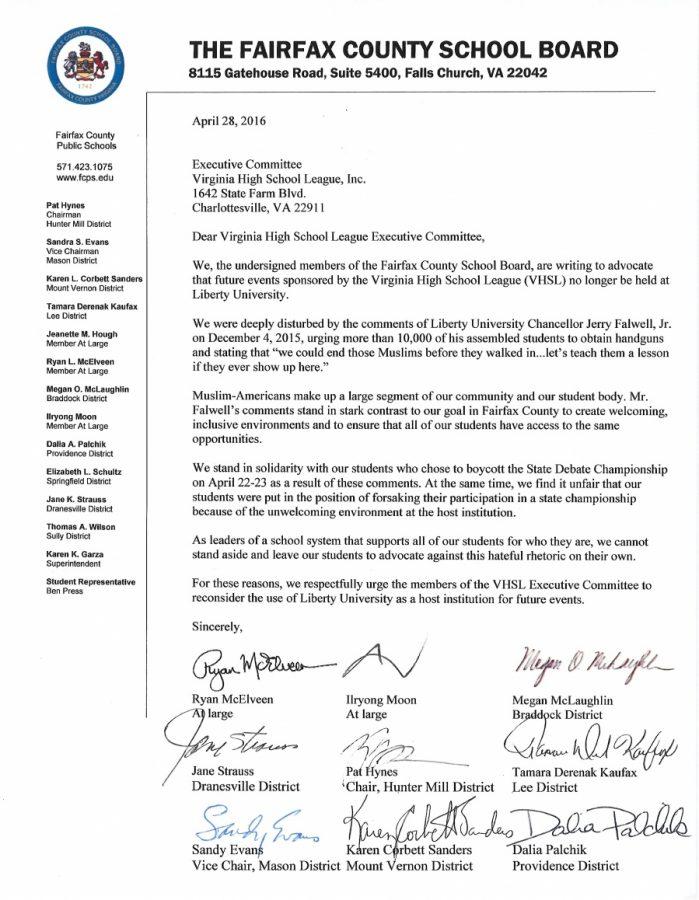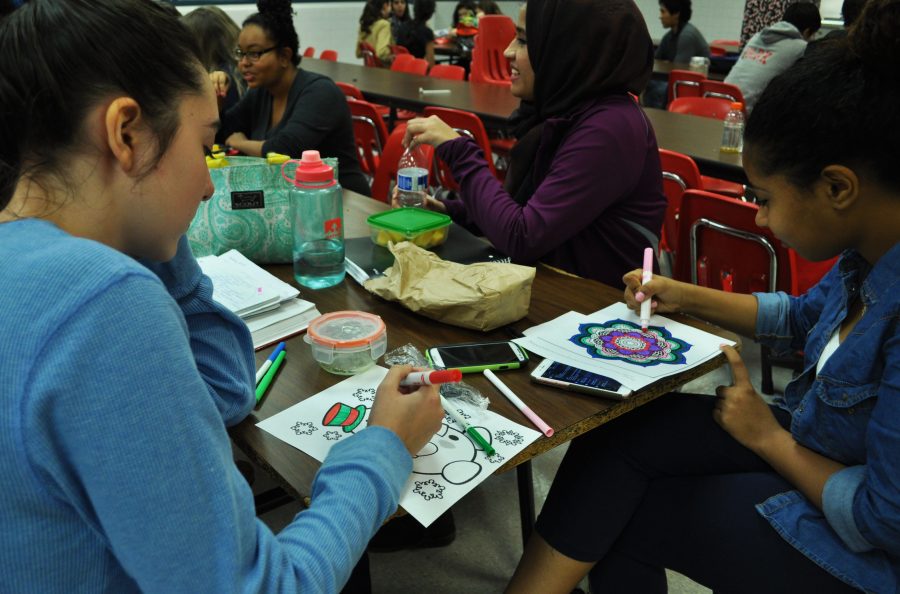Cancer is prevalent in the lives of many McLean students, whether it be a personal experience such as senior Andrew Katson’s fight to overcome Ewings Sarcoma or a student-run community event benefiting cancer research. Those who have been affected have united and responded in powerful ways.
One student’s story
“I couldn’t run past a certain speed or stretch,” Katson said. “If I tried to sprint, I would just fall on my face. I … wasn’t eating at all. I was turning very pale.”
Katson spent months reporting the pain to the doctors, eager for an explanation. However, the doctors were insistent on their belief that his physical health was fine.
“Every doctor just kept telling me that nothing was wrong and that I just had a torn tendon and that I should just go home,” Katson said. “But, there was some first-year right out of medical school resident doctor who … got really upset because he said, ‘You’re extremely pale. They’re wrong. If I can prove it, I’m going to have you admitted.’”
Despite the potential consequences, the resident doctor continued to contact Katson’s father, advising Katson to admit himself into the emergency room in the event that he experienced a certain list of symptoms.
“He said, ‘If you have any of these symptoms, come into the emergency room, get admitted and beg them for an MRI or blood test,”’ Katson said. “One day, I felt kind of nauseous, so I went in to the emergency room.” Upon request, Katson was able to undergo the blood tests, which showed significant inflammation.
However, the pediatric doctor was insistent on his belief that Katson was not sick. He believed the inflammation was due to a torn tendon. The resident doctor disagreed. He instructed Katson to go to the emergency room to get an MRI.
“The doctors both came in the next morning after I got an MRI in the middle of the night and they said, ‘You’re leaving today. There is nothing wrong with you. [The resident doctor] is going to get in a ton of trouble,’” Katson said. “Then, the MRI came in less than an hour later and they [said], ‘You have a massive tumor in your hip.’ They completely missed it. And they both came in three hours later, [saying], ‘It could have happened to anybody. It wasn’t our fault.’ I never saw them again after that.”
Katson was diagnosed with Ewings Sarcoma in October of 2012 at age 15.
“When I first found out, I was like, ‘OK, I got to deal with it and see where this takes us.’ And that’s kind of all I felt. I wasn’t extremely sad or anything,” Katson said.
Katson’s parents, however, felt a different set of emotions upon finding out their son had cancer.
“Devastated, sick to my stomach, completely lost,” his mother Angela Katson said. “As if the world had come to a screeching halt. In shock and disbelief, wishing it were not true.”
Soon after the diagnosis, Katson began the intensive treatment process. Over the course of three months, Katson was in the hospital for almost two weeks every month receiving chemotherapy. The chemotherapy was followed by multiple surgeries and six more months of chemotherapy.
“Chemotherapy is not what everyone thinks it is,” Katson said. “Everyone thinks that it hurts or burns, but it really just makes you nauseous and tired. It’s like eating bad food all the time.”
Chemotherapy drugs have a powerful impact on the body; while they are killing rapidly growing cancer cells, they can also harm healthy cells. This results in both physical and emotional side effects, including a weaker sense of well-being, changing moods and difficulties getting along with others.
“It’s hard to not be cynical when you have that much happen,” Katson said. “If I lash out at someone, I don’t mean anything by it. But they don’t recognize that. People get really upset. Before I had cancer, I had no idea how to say ‘I’m sorry.’ And so I had to kind of learn how to do that. I still have my moments where I get big mood swings, but in general I’d say I’m a lot better than I used to be at not getting so upset about everything.”
Katson’s social life was also affected as a result of his strenuous schedule.
“It’s hard to deal with someone who’s really sick,” Katson said. “I had maybe five or six really close friends and, at the end of the cancer, only one or two stuck around. Everyone at school forgets about you. And then, slowly, all your close friends. They can’t deal with it any more.”
Senior Alex Giagtzis is one of the few friends who were able to support Katson throughout the entire process. Giagtzis and Katson’s strong friendship provided a support system for Katson. However, it was a difficult experience for Giagtzis as well.
“When he’s got mood swings, that affects me. When he’s sad, that affects me. So I was feeling what he was feeling, but to a lesser degree since it wasn’t happening to me,” Giagtzis said. “My heart was with him all the time that he was in the hospital. I wished that many times … it were me in that hospital instead of him. If I could switch places with him, I would.”
The emotional extremity was no different for Katson’s parents.
“[It was] the most difficult process any parent should ever have to experience,” his father Peter Katson said. “It was humbling, exhausting, unpredictable and very scary.”
Katson credits a strong support system that helped him cope with the difficulties of the treatment process.
“The people that surround you, they always tell you how great you are and how much you should keep going,” Katson said. “It was moments like that where you meet people and you have an impression on their life and they enjoy talking to you. You recognize that you still have a lot to offer. I recognize that I have worth and value and that keeps me going.”
Those who surround and support Katson have gained valuable insight on the impact of cancer.
“You got to learn perseverance. You got to learn determination. To get through everything that’s put in front of you because there’s no use living if you don’t try,” Giagtzis said. “Every life has value. Every life is worth living.”
Katson’s family was able to re-affirm their strong ties.
“It brought us closer together, knowing that Andrew was suffering, could die and needed our complete support,” Peter Katson said. “His younger brothers stepped up to the plate and took on adult roles without complaining. It made each of us not only realize but truly understand that you cannot take life for granted.”
Katson underwent several surgeries due to infections in the cancerous area. The doctors attempted to use bone, concrete and metal, which all failed. The majority of the surgeries were each within three weeks of each other, and they made Katson somewhat numb to the situation. However, the last surgery came unexpectedly for Katson. It took place eight months after his previous surgery and two months after his chemotherapy had ended.
“They brought me in and [told me I] got infected again. And I was like, ‘Really? It’s been so much already. And now I have another infection?’” Katson said. “That was really tough for me because I was [supposed to] go back to school [that] year, but now I [couldn’t].”
Katson was forced to remain in his bed for six months after that.
“I had to get changed, I had to get dressed, I had to get washed, I had to eat all in one bed. I couldn’t go anywhere. I couldn’t even stick my feet off the side of my bed because it would pull my scar apart,” Katson said. “That’s how bad it was.”
During the time of the last surgery, it became challenging for Katson’s friends to keep visiting the hospital.
“It was hardest [during the last surgery] because not only were my friends dropping off the face of the earth, but also I had to get dragged right back into doing another surgery and doing rehab all over again,” Katson said.
Despite the hardships, Katson’s experience has instilled in him a new set of values.
“I’ve learned that you should try to not take a lot of things for granted—even things you don’t like—because I’ve never liked running, but I wish I could run and I can’t do that anymore,” Katson said. “I also learned that you have to be very comfortable with yourself. I spent a lot of time just sitting in the hospital by myself not talking to anybody. And you have to learn to be okay with just sitting there in complete silence and thinking. That was weird for me because I’ve never done that before—just sit and not talk to anybody at all.”
Katson’s parents have noticed the changes in their son since he took on the emotional and physical challenges of overcoming cancer.
“Andrew has become more determined, more mature and more compassionate towards others,” Angela Katson said. “He did not allow the prolonged hospitalization, constant infusions [and] blood work or physical weakness stop him from completing and excelling academically in both 10th and 11th grades.”
Due to both the physical and mental demands of the cancer, Katson chose to continue his education through online schooling while undergoing his treatment.
“It varied widely in its time frame,” Katson said. “Sophomore year, I finished three months late so I worked all through summer to finish my work, whereas junior year, I finished three months early. I was still on track, but it made everything shift around in a weird way.”
When reflecting on his past experiences, Katson has found ways to best deal with the strains of the cancer.
“Now that I think back on it, it’s been like three years since I was first diagnosed, and it feels like no time at all has passed,” Katson said. “But when I first got cancer, it felt like every week was this horrible, horrible thing I had to get over. But the second I started thinking of [how much time had passed], I started being able to drift through my cancer without having to take the brunt of every single experience. Look back at how much you’ve experienced, and you’ll see that you’ve weathered so much that you shouldn’t let any of your new experiences get you down.”
Katson currently visits the doctor once a month, which will eventually become once every three months, once every six months and then once every year for the rest of his life. Katson is estimated to be on crutches for two more years. Although Katson is still recovering from the exhaustion of the experience, he is feeling better than before.
“I have a lot more energy than I used to,” Katson said. “I’m still pretty tired most of the time, but I have a lot more energy. I just try to enjoy what I do have. I try to have fun.”
Katson still requires a certain level of support—doctors’ visits, physical therapy, etc. However, despite missing two years of school, Andrew plans to attend the College of William & Mary after graduation.
The community unites
The McLean-Langley community is responsive to the struggles that accompany a cancer diagnosis, and community members have been dedicated to their role in helping to find a cure and in supporting families like the Katsons.
On March 23, the McLean baseball team hosted a pediatric cancer benefit game for Kyle’s Kamp Organization.
“A local coach at Westfield High School, Rob Hahne, started the Kyle’s Kamp Organization after his son had cancer, and he started it as an avenue to raise funds for pediatric cancer and awareness through the local baseball community,” varsity baseball coach John Dowling said. “He reaches out to all of the local coaches each year. Coach Healy from Langley and I thought it would be cool if we co-hosted it every year.”
This year, 4-year-old cancer survivor Sabrina Premy threw the ceremonial first pitch.
“She had neuroblastoma when she was very young and she’s starting t-ball this year,” Dowling said. “She was very excited that she got to come out and throw the first pitch. Both the McLean and Langley teams gave her a hat and a signed ball, and she got a big standing ovation from everybody that was out there.”
Through the effort, they were able to raise over $1,200 for Kyle’s Kamp Organization.
This year also marks the second year McLean has teamed up with Langley High School to organize a Relay for Life event.
Relay for Life is a 12-hour event sponsored by the American Cancer Society. Participants form teams and raise money toward cancer research.
From May 16 to May 17, McLean and Langley students and staff will walk around the track at Cooper Middle School in order to show their support for individuals impacted by cancer.
Planning committees from both high schools have been working hard since the beginning of the school year to ensure the success of the event.
Katie Sue Van Valkenburg, who is a Relay for Life community manager, has been working closely with the Langley-McLean committee.
“I am just so impressed with the students who are in charge of it—they really give their heart and soul to it. I can go to them for any request, and they will live it out,” Van Valkenburg said. “If I give them a challenge, they will probably go above and beyond that. Last week, we had an online challenge. I asked them to raise $1,500—you guys raised $4,000 in one day alone.”
This year, the goal is to raise $120,000. Throughout the year, the committee has held car washes, covered School Resource Officer Scott Davis’ police cruiser with Relay Post-It notes and held benefit nights in order to reach the goal and to raise awareness about the event.
Events like Relay for Life and the pediatric cancer benefit baseball game bring attention to the prevalence of cancer in the lives of many McLean students.
“I started to realize how much cancer is in everyone’s lives. Even though it hasn’t impacted me dramatically, my grandma did have cancer, and my dad had a little scare last year,” said junior Emma Chamberlayne, who is the special events chair for Relay for Life. “I’m just so happy to be a part of [Relay for Life] for me, for other people and for the cure in general.”
Although participants of Relay for Life have differing reasons for their involvement in the fight against cancer, they all share the same goal.
“I hope that all of these lovely students walk away with the feeling of accomplishment and the fact that they really made a difference towards the fight against cancer,” Van Valkenburg said.
